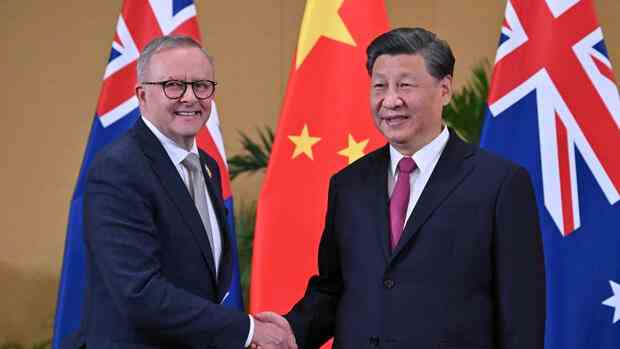Bangkok In one of the most violent trade conflicts in recent history, the notification to Guangdong customs is a significant signal for peace: a few days ago, officials in the southern Chinese port city were instructed by the local government to allow coal deliveries from Australia back into the country in future. With the move, China ends an unofficial boycott of Australian coal suppliers that lasted more than two years and disrupted global trade routes for the energy source.
The Chinese import ban on fossil fuels was part of a comprehensive package of measures with which the government in Beijing wanted to put economic pressure on Australia – in response to an increasingly China-critical course by the government in Canberra. The lifting of the import ban is now raising hopes in Australia that the costly conflict is nearing its end. At the same time, economists warn against becoming dependent on China’s market again.
China has long been one of the most important export markets for Australian coal producers. In 2019, the China business brought in around 14 billion dollars. Producers from other sectors – such as winemakers, barley farmers, cattle and lobster breeders – also lost billions in sales as a result of the trade dispute. Overall, exports worth around $23 billion were affected by Chinese import restrictions, analysts at investment manager AMP Capital have calculated.
Top jobs of the day
Find the best jobs now and
be notified by email.
The opening of the Chinese market that is now expected is still in its infancy: So far, only four Chinese state-owned companies have received permission to import Australian coal – and only for their own purposes, i.e. not for resale.
Representatives of other affected industries still have to wait. The seafood industry is currently pinning the greatest hopes. A Chinese diplomat’s visit to a farm in Western Australia was taken as a sign of relaxation. Chinese importers expect lobster trade between the two countries to restart in the second half of the year.
Australia’s Prime Minister Albanese is optimistic
Australia’s Prime Minister Anthony Albanese is optimistic that positive change is possible: “China is our most important trading partner and we have been working to change relations,” he said over the weekend. “It is in Australia’s interest to be able to export freely to China,” Albanese said. “It is also in China’s interest to keep these exports from Australia.”
Only four Chinese state-owned companies are allowed to buy coal from Australia again – and only for their own use.
(Photo: Reuters)
From the point of view of observers, however, there are less economic than political reasons why China is willing to relax trade restrictions. Although Australia was the country’s second most important coal supplier until the boycott began, China has long since found substitutes, for example in Russia and Indonesia.
The decision to allow imports again should therefore be understood primarily as a “cautious step towards resuming bilateral relations between the two countries,” comments Australian-trained political scientist Zhongzhou Peng, who is now doing research in Shanghai.
The primary trigger for the new start was the change of government in Canberra last year, when Albanese replaced conservative Prime Minister Scott Morrison with his Labor party. Morrison’s government had repeatedly enraged China with harsh rhetoric. The then head of government’s call for an independent investigation into the origin of the coronavirus in China prompted the boycott measures.
China has not achieved its goals
However, China’s President Xi Jinping had to admit that the economic pressure did not help him to persuade Australia to adopt a more pro-China policy. On the contrary: the confrontation ensured that the government in Canberra massively increased its security cooperation with other western countries. Australia, for example, joined forces with the USA and Great Britain as part of the Aukus security partnership – with the aim of equipping the Australian military with nuclear submarines.
Before the boycott started, Australia was China’s second most important coal supplier.
(Photo: Reuters)
At the same time, Australia’s economy quickly managed to open up new sales markets and thus become more independent of the People’s Republic. Australian economists warn against reversing this: “Hopefully we’ve learned our lesson,” commented economist and publicist David Llewellyn-Smith. “Genosity from Communist China does not come for free. It comes with strings attached that can easily become a national stranglehold if we are not careful.”
>> Read here: “We need to diversify” – Australia presents itself as an alternative to China when it comes to commodities
Prime Minister Albanese does not want to lose this caution either. True, his rhetoric is less aggressive, which allowed the resumption of direct contacts at government level. In principle, Albanese China does not want to give in: “We will cooperate with China where we can, we will disagree where we have to, and we will stand up for our national interests,” he said in a TV interview on Tuesday.
This also includes Australia’s further armament: As part of the increasing military cooperation with the USA, the Albanese government announced on Wednesday the purchase of 40 US military helicopters for around two billion US dollars. The US also plans to station up to six nuclear-capable B-52 bombers in northern Australia, it was announced in October.
Richard McGregor, China expert at Australia’s Lowy Institute, concludes: “With its trade restrictions, China has not achieved its main objective of imposing high costs on Australia’s economy and thereby changing national security policy.”
More: Australia’s ex-PM warns of losing all foreign investment in China
